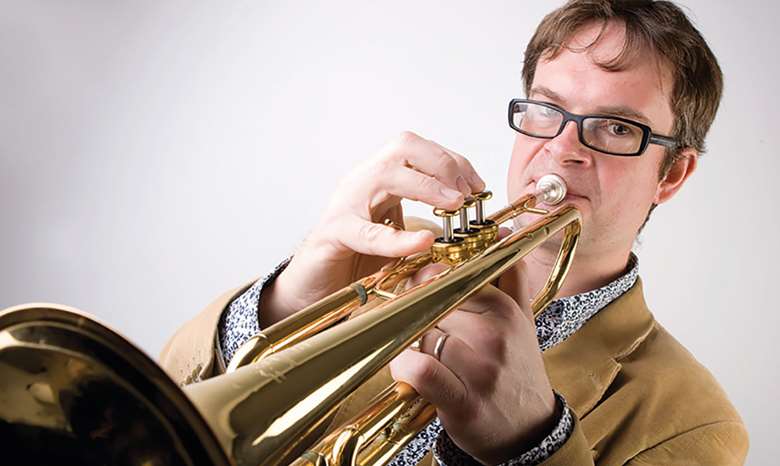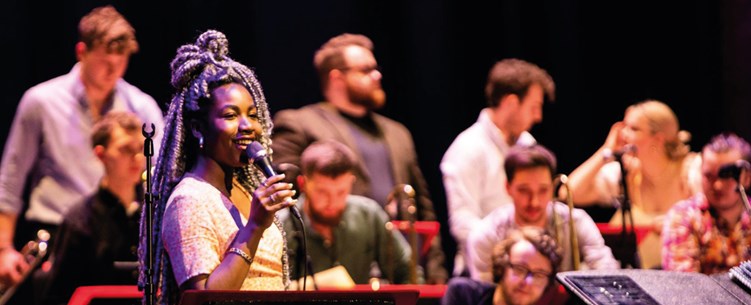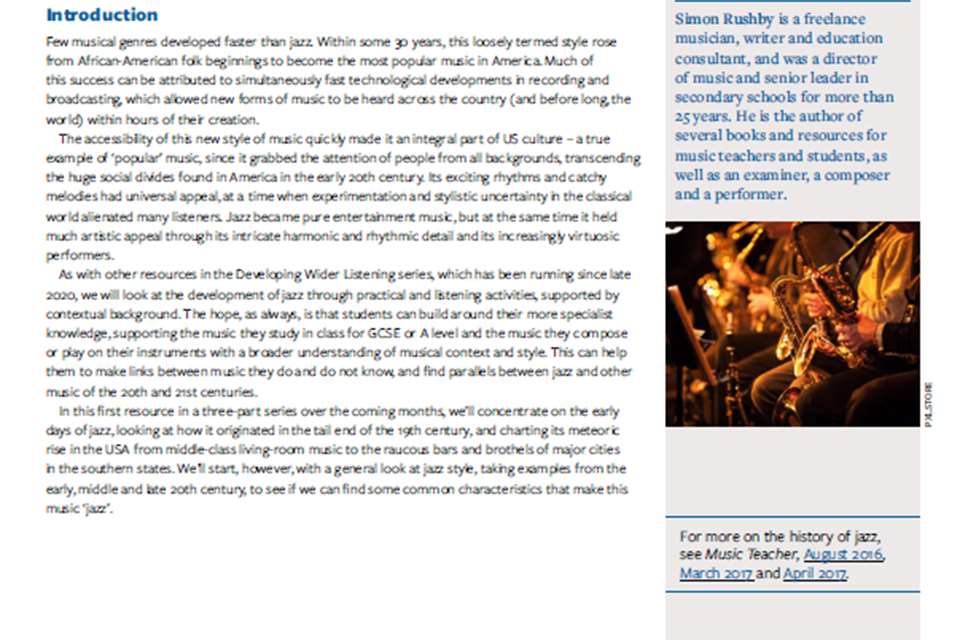Q&A: Mark Armstrong
Hattie Fisk
Monday, May 1, 2023
Balancing his roles of ABRSM chief examiner, NYJO head of music, RCM jazz professor and freelance trumpet player, Mark Armstrong is a mover and shaker in the world of music education. Here, he squeezes in a quick chat with MT's Hattie Fisk.

RCM/ Mark Armstrong
HF: What was your own music education like?
MA: I went to an incredible state school called Dr Challoner's Grammar School, where I was given the opportunity to learn the trumpet and explore music thanks to Buckinghamshire County Council music service. I then did an academic music degree, which I enjoyed as it made me listen to music I wouldn't listen to otherwise, but I was sightly frustrated that I didn't get a chance to explore more of the jazz side of things formally. Having said that, I had a great time doing little gigs with friends and resurrecting the Oxford University Jazz Orchestra with fellow musician Sarah Cropper. I went on to do a postgraduate course in jazz and studio music at the Guildhall School, and from a career perspective that is where I started to get work as a player. My amazing teacher Noel Langley, an active commercial trumpet player, used to ask me to deputise in his shows, introducing me to a thriving network of musicians in London.
HF: What were the early years of your career like?
MA: I spent a lot of time in my early career doing West End shows as a deputy, which was a great way to make a living. It was a real challenge, too, because you didn't necessarily have time to take the music home and practise it – you just went in and sightread it on the spot. There was one show where someone got stuck on the motorway. I think it was Fame. I had to go in and sightread the part having never played it before! I remember doing two shows of Fame on a Saturday and then walking across the West End and doing the Late Show at Ronnie Scott's with a jazz quintet – I really thought I was living the dream.
HF: Tell me a bit about the many hats you wear and how you came to be a member of so many organisations.
MA: I started working as an examiner for ABRSM about 20 years ago, when I simultaneously began working at the RCM, directing their jazz orchestra and then becoming a jazz professor. I have been doing that ever since, delivering academic classes and some one-to-one teaching. I have also been associated with the National Youth Jazz Orchestra (NYJO) for as long as I can remember. I used to be in the band when under 25, and then when I became too old, Bill Ashton (who was the founding musical director) asked me to start taking some of the rehearsals. When he retired, I took over on an informal basis, and then was given the job of artistic director. I think my title is now head of music because we reconfigured the setup slightly, so I can juggle the other things I am involved with.
HF: You were appointed as an ABRSM chief examiner six months ago. What do you hope to bring to this position?
MA: Chief examiners have a responsibility for liaison between the wider examining team and people in the office; they bring the voice of freelance examiners into the building. It is really important to have a cohesive and holistic understanding of what the role of an examiner entails, because on a freelance basis it can be a somewhat isolating experience. As well as improving this experience, I want to make sure that whoever takes an exam – wherever they are geographically and whoever the examiner – there's consistency in terms of the results and the manner and method of marking.
HF: Are there certain changes you are looking forward to implementing as part of the ABRSM team?
MA: What I am anxious to do now is to help refresh the resources available and expand on them. I can say, with one foot inside the door, that ABRSM has a plan in place to expand the whole suite of exams. We are looking to introduce jazz performance grades, so you can take jazz grades online like you can with other grades. Depending on interest and how things go, it would be great to expand this offer, so that we go all the way up to Grade 8, too. That is one of my specific areas of focus. Another is to try and create a stronger sense of liaison at different levels between the royal colleges and the exam board.
HF: Historically, there has been tension between teachers and exam boards. Do you think there is room to create further transparency in exam board processes?
MA: I think there is. We have just launched a teacher hub at ABRSM and are providing a lot of teaching resources and CPD, not just written by ABRSM but also by external experts. We know that this is the kind of thing that creates stronger connections between teachers and the process of examining.
HF: What changes do you wish to see in the next 5 to 10 years of the music education sector?
MA: I want it back the way I remember it. I want more funding. I want an acknowledgement from government that this is an incredibly important part of our culture and society and that, actually, it's not an insignificant part of the economy. Things start in school, and we need to create and maintain that pipeline. Opportunities are being denied to people who can't afford an education in the private sector; I don't remember this amount of blockage when I was a child.
When I started my lessons at school we were coming out of a pretty serious recession and a funding crisis. Even then, there didn't seem to be a problem with having free music lessons on Saturday mornings and attending the Amersham Music Centre for a greatly reduced fee, or going on tour with the Bucks Youth Orchestra, or doing concerts at the Royal Albert Hall with mass choirs. All of those things were such incredible experiences for me and some of that has been eroded, mostly due to funding.
I think the other thing is to make sure that teachers in the primary sector feel comfortable and confident when teaching music, that they are generous teachers and don't feel that music is a specialist thing that people do by magic. Music is a skill that can be learnt, but it needs time and funding. That is my vision: we need more money, and we need to embed music back into society as a given thing in schools, because it used to be and it was affordable.
HF: Do you have a message you would like to tell our readership (of music teachers)?
MA: My wife is a head of academic music at a school, and I see how hard she works and how much of her heart and soul she puts into her role. If I had to share one message for fellow teachers, it would be that all that goodwill, commitment and passion for our art-form does not go unnoticed. Even if sometimes it feels like you're shouting into the wind, you do touch people's lives when you teach music, and someone will remember. It is important that we keep the faith.
 © Victoria Wai/ NYJO
© Victoria Wai/ NYJO
NYJO members performing at The Fire Station, Sunderland, as part of the Amy Winehouse tour, 2022







